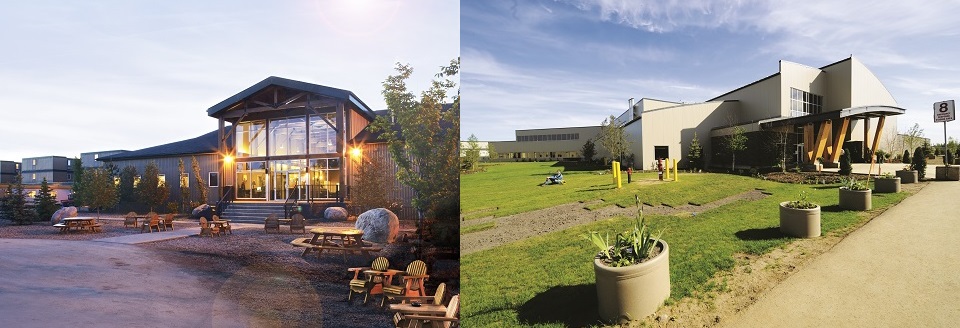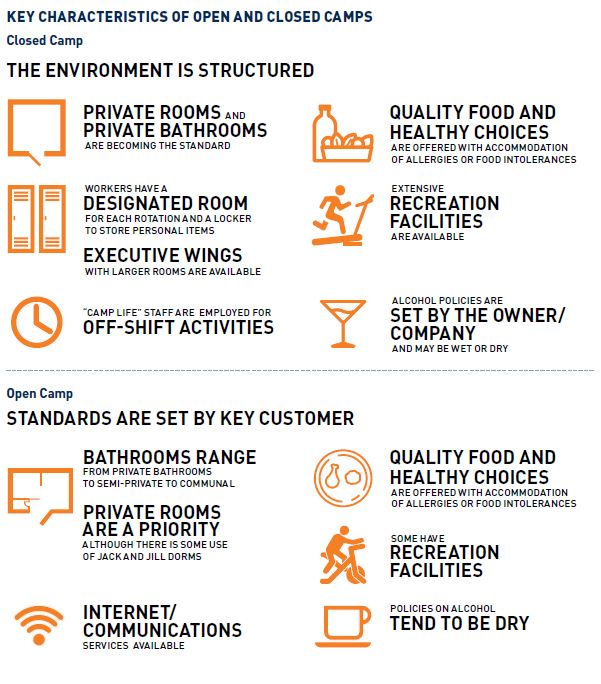Open? Closed? What’s the difference when it comes to rotational work camps?
- 3 min read
Happy Monday! This week, we share the remainder of our rotational workforce facts. Here’s #5!
Fact #5: Camps aren’t all one and the same – they can be different.
Camps fall into two general categories: those that are for the sole use of an owner/company and those that are operated and leased by camp companies. While they may look virtually the same from the outside, they operate under different business models.
Owner/company camps can be either open or closed. An owner/company may have spaces available for rent, making them open to other companies. Camps are considered closed if rooms and facilities are available only to the owner or company. Conversely, camp company lodges are generally open and operate like a hotel.

Owner/company camps are typically planned and built to meet the needs of a specific oil and gas operation and are intended to operate on a closed basis. These types of camps are more permanent structures built to support long-term operations and are located on a company’s property or lease. They are more self-contained than open camps. In fact, some oil and gas companies, especially those in the oil sands, have their own water treatment plants and emergency services. Companies that own their closed camp facility will generally contract its operation to an external company, normally the same companies that operate open camps.
Owner/company camps are most often seen as an extension of the operating company, so camp policies and culture mirror those of the company. These camps offer an environment where there is respect for rules and co-workers, similar to a home and family situation. After-work group activities such as hockey games help build camaraderie and a life outside of work. As there are no personal vehicles generally allowed, and sites are remotely located, workers stay on-site during their rotation. This enables the company to have significant control over workers and their environment from a health, well-being and safety perspective. Consequently, these camps are frequently wet in that they allow alcohol consumption when the shift is over. Professional hospitality staff fill an important management element to respond to any situation that compromises behaviour and fitness for work expectations.
Open lodges owned and operated by camp companies are run very much like hotels or college residences; however, they are generally temporary or scalable as operations ramp up or down, shut down altogether or move to another location. They often serve the needs of seasonal oil and gas services such as drilling. Clients, including oil and gas companies, construction, maintenance or other service contractors, can reserve a specific number of rooms or the entire lodge. Open camp operators are more likely to rely on resources and contracted services from the local community, including staffing, water, power, waste and sewage management, materials and supplies. As a result, companies that operate open lodges will generally establish community contacts and partnerships.
The larger open camps or lodges are surprisingly similar to company-owned closed camps except it is the camp operators who establish the camp culture and rules for multiple companies and their employees. Group activities and contests, dining theme nights, lounge areas, games rooms and workout areas encourage workers to interact outside of their rooms and create a healthy social environment. Somewhat different to closed camps though, camp operators also use experienced camp managers and 24-hour security staff, sometimes including sniffer dogs, to monitor worker behaviour, including the use of prohibited substances. Workers are required to acknowledge camp rules in writing, including the camp operators’ right to conduct room checks, and face eviction if they fail to follow rules. Open camps are often dry, meaning no alcohol is allowed on the premises.

Want to know more? Download the report!
Did you miss last week’s rotational workforce facts? Check out the rest of our blog!
